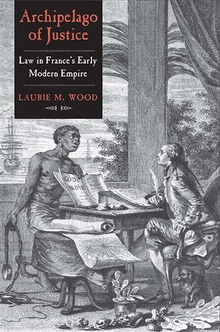 Out soon by Laurie Wood, Florida State University, is Archipelago of Justice: Law in France's Early Modern Empire, published by Yale University Press. From the publisher:
Out soon by Laurie Wood, Florida State University, is Archipelago of Justice: Law in France's Early Modern Empire, published by Yale University Press. From the publisher: This book is a groundbreaking evaluation of the interwoven trajectories of the people, such as itinerant ship-workers and colonial magistrates, who built France’s first empire between 1680 and 1780 in the Atlantic and Indian Oceans. These imperial subjects sought political and legal influence via law courts, with strategies that reflected local and regional priorities, particularly regarding slavery, war, and trade. Through court records and legal documents, Wood reveals how courts became liaisons between France and new colonial possessions.Praise for the book:
“Laurie Wood makes innovative and sophisticated use of hitherto ignored legal sources to reconstruct the complex socio-political relationships that shaped life in the eighteenth-century French Caribbean and Indian Ocean.”—Richard B. Allen
"Laurie Wood has written an innovative, original book that will be of great value to anyone interested in early modern France and its overseas empire. She shows, lucidly and on the basis of exhaustive research, how ordinary people throughout the empire, in vastly disparate territories, were able to make use of a remarkably uniform legal system, based in the so-called conseils supérieurs. In short, she shows convincingly how this legal system helped to knit the empire together."—David Bell
“Archipelago of Justice combines local and transnational frames of reference to show how the magistrates and litigants of a far-flung network of courts at the outer limits of the monarchy’s sphere of authority helped tie France’s global empire together into a largely unified and cohesive whole.”— Michael Breen
Further information is available here.
--Mitra Sharafi